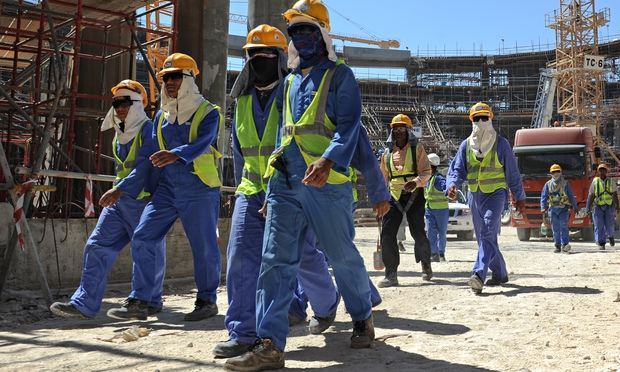The international community has devoted an unprecedented level of attention to migrant labor abuses in Qatar since its successful bid to host the 2022 World Cup. NGOs and governments alike have called on the Qatari government to increase protections for migrant workers amidst a slew of abuses. Qatar has not been alone in facing international scrutiny: the increased attention has put pressure on other Gulf States to introduce reforms, and some have begun to act. As more states begin to toy with labor reforms, Qatar’s slow progress and lack of tangible results stands to draw additional criticism.
In May 2014, the Government of Qatar announced plans to introduce major reforms to its labor system. According to the government, the proposed reforms would shift control of exit permits to a system run by the Ministry of Interior, increase the penalty for confiscating travel documents, require wages to be paid electronically, and enforce accommodation standards. Just this July, however, the Shura Council proposed new provisions that would make it more difficult for foreign workers in Qatar to change jobs.
Amnesty International released a report in May 2015 analyzing migrant labor abuses that continue to affect the country’s workers. The report investigated nine key labor rights issues: the system of exit permits, restrictions on changing employers, the lack of protections for domestic workers, non-payment of wages, recruitment agency fees, dangerous working conditions, obstacles to accessing justice, denial of the right to join unions, and failure to enforce existing labor standards. Since the government’s 2014 announcement of new safeguards, Amnesty found that it had made only limited progress on five issues and no improvement on four. Despite its promises of substantive reform, Qatar has stalled on its commitments while workers continue to suffer.
These labor abuses are not limited to Qatar. Major development projects in the UAE have drawn in thousands of low-paid migrant workers, contributing to the more than five million migrant workers currently employed in the UAE. Inadequate housing, low or non-existent pay, confiscation of passports, prohibition to join unions, and limited ability to change employers represent some of the most common abuses for these workers. A 2015 Human Rights Watch Report on the UAE’s Saadiyat Island, a development project that will host branches of the Louvre, the Guggenheim, and New York University, reported that employers continue to withhold workers’ wages, confiscate passports, and provide substandard accommodations. The report additionally noted instances of summary deportation of workers who attempted to go on strike in 2013.
This fall, the UAE felt compelled to take action. On 29 September, UAE Labor Minister Saqr Ghobash decreed several labor reforms aiming to introduce greater transparency into employment contracts and to increase oversight of employment arrangements. The labor reforms would require prospective workers to sign standard employment offers to be filed with the Ministry of Labor before work permits are issued. They would also give the Ministry of Labor the power to approve requests for employment changes, though in other countries where the Ministry of Labor possesses this power, the Ministry rarely approves such requests. The reforms will reportedly be implemented through government decrees and will take effect in early 2016.
At face value, these reforms represent positive steps. But taking the government’s promises at face value does not accurately represent the continued lack of improvement on the ground. The UAE previously introduced labor reforms in 2010, but it has largely failed to investigate violations and enforce new laws. Human Rights Watch’s Nicholas McGeehan praised the UAE’s recent promises of reform, but also warned of unwarranted enthusiasm, noting that some provisions seemed “rehashed” from old reforms that failed to create lasting change.
Neither the UAE nor Qatar has matched its words with effective action. The proposed reforms do not address the failure to enforce existing labor standards and to implement past reforms, calling into question the vigor with which the government may implement future reforms. Further, many of the decrees in both Qatar and the UAE require substantial oversight from government agencies that have been negligent in adequately protecting the rights of migrant laborers in the past. Unless these governments find the political will to actually implement the reforms they espouse, and to hold employers accountable for perpetuating abuses, promises of reform will continue to ring hollow.





